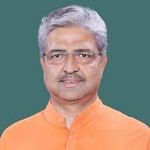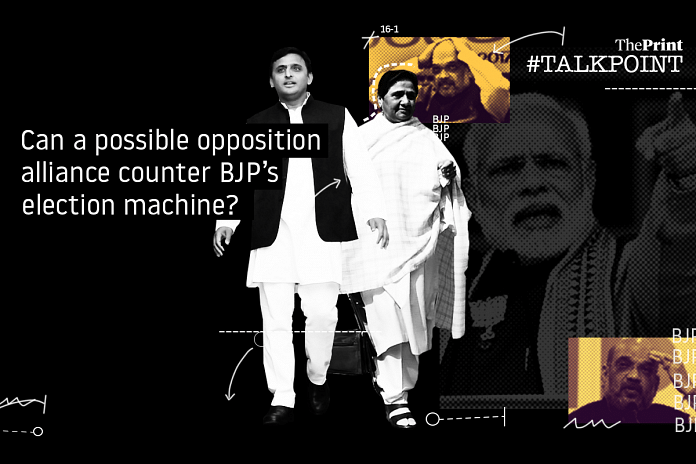With the BJP’s historic win in Tripura, and six of the seven states in the northeast now under its rule, talk of an opposition alliance for 2019 is heating up again.
This weekend, Telangana chief minister K Chandrasekhar Rao claimed he had the support of political leaders like Mamata Banerjee for his ‘People’s Third Front’. In Uttar Pradesh, SP and BSP have announced a tie-up against the BJP for the upcoming bypolls in two parliamentary constituencies.
ThePrint asks: Can a possible opposition alliance counter BJP’s election machine?
The BJP’s divisive agenda won’t work anymore, will be visible in Uttar Pradesh
 Abhishek Mishra
Abhishek Mishra
SP national spokesperson and former UP cabinet minister
It is ultimately the will of the people that reigns supreme in a democracy. It is not about one leader or another coming to power. It is about the dreams and aspirations of sections of populations coming together. It is about people feeling disillusioned, dissatisfied and demoralised with the central government doing little vis-a-vis farmers, job creation and economic growth. They haven’t delivered on education, health, railways and road travel either. When such unfulfilled aspirations come together, they will look for new leadership.
For example, the youth, irrespective of the caste structure, are feeling distressed. They want a response from the Prime Minister on failing to deliver on what his government says. Their divisive agenda will not work anymore because demonetisation and the job crisis are hitting people in their homes. It will find its manifestation in UP with a vote shift towards Akhilesh Yadav, and other leaders in different states.
We must analyse the northeast results in retrospect. Except for Tripura, the vote is anti-BJP. They may be able to form governments because of the system but that isn’t a vote of confidence in them. The people of Nagaland allied against the BJP. There is a huge difference between winning an election on the strength of your policies and leadership, and forming a government. The BJP has lost those states and those elections. If you look at Meghalaya, the numbers favour the Congress.
It isn’t the opposition’s coming together that will defeat the BJP; it is the aspirations and frustrations of people that will find a vent in the opposition that will defeat the BJP.
An opposition coalition doesn’t guarantee victory against BJP
 Sanjay Kumar
Sanjay Kumar
Director, Centre for the Study of Developing Societies
Even if all the opposition parties come together against the BJP, it may not be easy for them to counter the BJP’s election machine.
Gone are the days when the BJP won elections only on account of a split in the anti-BJP votes. In the recent past, the BJP has managed to win elections in many states with convincing margins. In most of the Hindi heartland, where the BJP is in a bi-polar contest in MP, Rajasthan, Chhattisgarh, HP and Uttarakhand, and some other states like Gujarat, the party’s voteshare exceeds 50%. And these states account for a large number of parliamentary seats.
Even in states like UP, Bihar, West Bengal and Odisha, where the BJP faces a multi-cornered contest, the party’s support base has expanded. The BJP managed to poll more than 40% of the votes in UP. Its victories in Haryana and Jharkhand may have been won with a lower voteshare, but the BJP’s lead over its nearest rivals here was sizeable.
The BJP may find the contest tougher in states like UP, Bihar, West Bengal, Odisha and Karnataka, but an opposition coalition alone can’t guarantee its rivals victory.
Senior leaders of different parties may work out an alliance, but the local-level leadership does not always gel together. Having been at loggerheads for a long time, the core supporters of different parties may not be able to work together on the ground.
The coming together of all opposition parties against the BJP might result in counter-polarisation as well.
But two questions still remain unanswered — Firstly, can they all come together?
There are state-level equations between political parties that would work as a strong hindrance.
Secondly, if they do manage to come together and win elections, what next? We know what happened in Bihar. People would keep this in mind while deciding whether to vote for any such grand alliance.
No one is invincible in politics and disenchantment with BJP is visible
 Sudhindra Bhadoria
Sudhindra Bhadoria
Senior BSP leader
The idea of opposition unity to defeat the BJP has gained attention after our principled stand for the UP by-polls.
Let me make it very clear that Behen Mayawatiji has done this with a limited objective, keeping in mind the emerging danger to the Constitution and India’s social fabric. The future depends on how others face the challenge and commit themselves to working for the empowerment of the Dalits, OBCs and minorities, especially Muslims. Behenji will walk the bridge when the time comes, depending on several factors.
Having said that, I am of the firm view that nobody is invincible in politics. We have seen Indira Gandhi, Rajiv Gandhi, and Atal Bihari Vajpayee lose elections. Anything is possible if the people of the country take a resolve and I am quite sure it will happen again. Therefore, to say that the BJP’s victory is permanent is not correct. It is the Constitution and the social fabric of the country that are permanent. In a democracy, the people are the opposition and it is they who make or break a party or leader.
The fight against the BJP has to be undertaken on the principle of ensuring justice and welfare to India’s Dalits, minorities, OBCs and poor. That’s the only way to defeat this venom of communalism and divisive agenda which uproots the poor and empowers the rich. The large-scale disenchantment with the BJP is visible. Be it farmers, youth or small businesses, the government has destroyed them completely. When Behenji tried to raise the issue in the Rajya Sabha, there were attempts to suppress her voice, the voice of poor people. This will not last long and things will change.
Till a clear leader emerges, opposition alliances will be doubted even by those in them
 Bharatendra Singh
Bharatendra Singh
BJP MP from Bijnor
The BJP has always had a ground-level approach to elections. What we have is a booth-page strategy. Every booth has around 1,000 voters, which make approximately 20-25 sheets. Each sheet is assigned to a BJP worker. It doesn’t matter if you’re an MLA, MP or the PM, every worker has to take care of their booth. It is a simple approach that winning the booth will win the election. This strategy has been worked on and perfected over decades and is no instant success formula.
For a party to develop this kind of a committed cadre of disciplined workers at each booth is impossible. In the northeast, along with this, it was the sacrifice of BJP workers over decades that won us the election. Thousands of workers have been murdered there for speaking up for cultural nationalism.
The BJP’s long-term aim of ‘Param Vaibhavam swarashtram’, that is, ‘I strive to see my motherland at the pinnacle of its glory’, is the inspiration in every worker’s heart.
For parties with an immense ground-level presence, even if the top leaders form an alliance, there will be rebel candidates and workers who do not agree to it. They will not want to compromise.
An opposition alliance is not possible in UP because at the ground-level there are too many workers in the SP, BSP and BJP. Geographically, too, BJP, BSP and SP are spread all over the state. For parties like the Congress and the Lok Dal, who are barely left with any presence in the state, it is easy to form an alliance.
Mayawati’s vote-bank is shifting to the BJP. For a party that led a full majority government from 2007-2012, they have lost ground terribly. Yet, Mayawati can’t compromise the interest of her party and its ideology. It is not possible for her to form an alliance with a party whose workers almost killed her in the infamous ‘guesthouse incident’.
In UP, the BJP government has maintained law and order, with criminals surrendering out of fear that, if they are caught by the police, they will face interrogation and a lot more charges. The UP government is requesting courts to allow criminals to be interrogated further while in judicial custody. Many criminals have been cornered and others shot.
Moreover, with the state and central government working in tandem, many central projects are now trickling down to the local level.
As for Chandrasekhar Rao leading the ‘People’s Third Front’, he neither has the seniority, nor the experience or numbers to appoint himself the leader. Why should a Mayawati or an Akhilesh follow his leadership when UP has 80 members in the Lok Sabha, while his state only has 17? Till the time a clear leader emerges, this kind of an alliance will always remain suspect, even within its own members.
To challenge BJP, the opposition needs to build a consensus on a single leader
 Kumar Anshuman
Kumar Anshuman
Associate Editor, ThePrint
It is not the first time that there is a majority government at the Centre. In fact, barring a few instances, Indians have always voted for a majority government. The template changed a bit in the late 1980s, and, after that, no single party was in a position to cover the entire country on its own. Then came the era of coalition governments, where the leading party would ally with regional forces. Now, the difference is, despite being at the head of a coalition, the BJP has a majority in the Lok Sabha on its own.
History suggests no one is invincible in a vibrant democracy like India. In 1977, a larger group came together to defeat Indira Gandhi, who was hugely unpopular post Emergency. In 1989, another such grouping took shape under the leadership of V.P. Singh, and Rajiv Gandhi, who had headed a government with a big majority, lost.
The question is: can this happen again? In all the past instances, the majority governments couldn’t control the narrative and things went out of their hands too soon. Rajiv Gandhi lost the election on Bofors, Indira on Emergency.
On the contrary, the Modi-led BJP still controls the narrative even after four years in power. Some decisions such as demonetisation and GST have hit them, but they did not lose the narrative and a large number of voters still favour them over others.
Another difference is the emergence of regional parties with their own political ambitions and vested interests. Regional parties existed in the past too, but at the national level, there was an anti-Congress agenda pursued by several national leaders. Leaders like V.P. Singh, Vajpayee, Morarji Desai, Chandrashekhar and George Fernandes had a pan-India appeal.
What we have today are leaders whose regional interests take precedence over the national agenda. So, their ideology is driven by what suits them and, accordingly, they ally with the larger party. The BSP and the SP have come together in UP for the bypolls, but they are not sure whether they will do so again. If the opposition wants to present any sort of challenge to the BJP, it needs to build consensus on a single leader. And they need to do it now, so that they can offer an alternative to people and hit the ground with a joint strategy. Currently, that strong urge to defeat the BJP is not visible.
Compiled by Deeksha Bhardwaj, Journalist at ThePrint.




Stop obsessing about One leader as if it’s some Messiah we are waiting for. And stop wanting this man (atleast think of a woman or transperson as option) to be louder, shriller than Modi. It’s alright if it’s some quiet backroom worker who doesn’t shriek so much but knows policy and finance
Perfect and apt analysis.